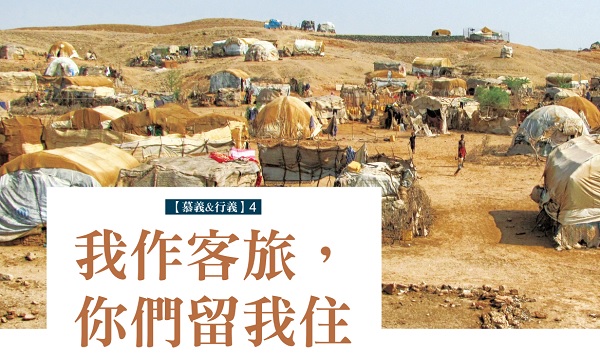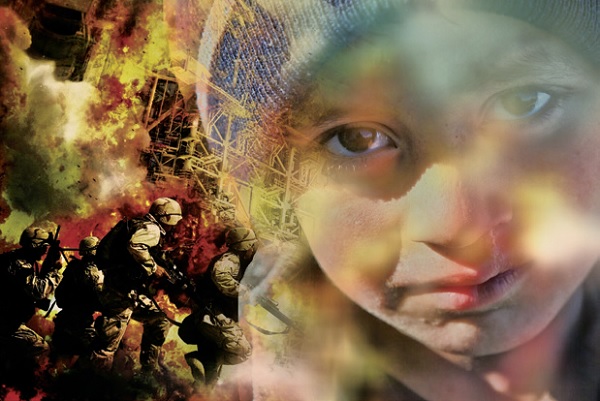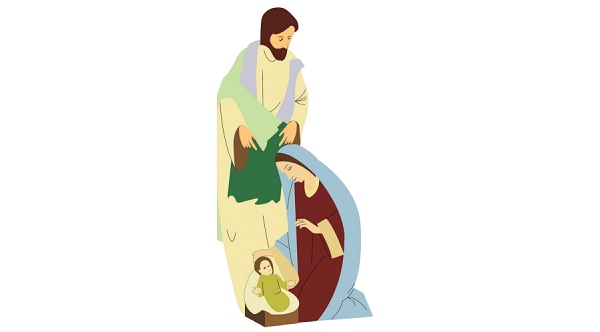I am a stranger and you invite me to stay
【Muyi&Xingyi】

▲The war has left millions of people displaced, hungry, poor and sick, creating a humanitarian crisis.
A global flood of refugees abandoned by the world
Discrimination that has coexisted with human history has brought about not only gender, race, and class oppression, but also national struggles, national civil wars, and even international conflicts. As a result of the wars all over the country, thousands of innocent lives were displaced. Today's wave of refugees has spread from North Africa and the Middle East across the world, causing a humanitarian crisis.
According to the United Nations High Commissioner for Refugees or UN Refugees Agency (UNHCR), nearly 68 million people around the world are homeless today, and nearly 33 million people have been forced to flee their home countries. Among them, Yemen (Yemen, or translated as Yemen) is the most popular. The war in Yemen, led by Saudi Arabia and supported by the United States, has bombed and attacked civilian infrastructure, hospital facilities, and even civilian weddings, funerals, and school buses. The impact has been so widespread that 8 million people are on the verge of starving to death, 1 million people have contracted cholera, and 3 million people are homeless in the country.
Furthermore, the Rohingya people, dubbed "the world's most unpopular ethnic minority" by the British Broadcasting Corporation (BBC), were forced to leave their homeland by the brutal force of the Myanmar government and army, with 1.2 million refugees, including 650,000. 5,000 people fled to neighboring Bangladesh (Picture 2). The United Nations calls it a typical example of ethnic cleansing, and there are so many victims of broken bodies and souls!
Due to the corruption of Central and South American governments, the proliferation of gang violence and drugs, thousands of ordinary people, old and young, fled their countries in caravans, seeking political asylum in the United States for the prospect of safety and freedom. However, after a long journey, there was a cold rejection at the end of the journey. They either wait at the border without knowing where to go, or they are deported back to unsafe and dangerous environments. In the city of Tornillo on the Texas border alone, nearly 3,000 underage children remain in a "tent city", waiting to be reunited with relatives in the United States. Heartbreakingly, a seven-year-old girl and an eight-year-old boy died in U.S. border custody at the end of 2018. The cause of death was still under investigation when this article was published (January 2019).
The number of refugee flows continues to rise. An average of 34,000 people become refugees every day due to war around the world, including many Christians who are persecuted for their religion. This is equivalent to one person in every 113 people in the world being displaced, and 24 people are forced to flee their home country every minute. Many refugees are injured and die while fleeing, and they are enveloped in fear and despair. A baby lying on the beach with his face on the beach, a little boy sitting alone with blood on his face, wanting to cry without tears, and a sampan floating in the waves, crowded with passengers seeking life, all kinds of images became the focus of the news. After it went viral on the Internet, did it leave a mark on people's hearts?
In the face of these humanitarian crises, countries in North America and Western Europe are still tightening or even withdrawing their refugee admission policies for reasons of security and anti-terrorism, and the media are increasingly avoiding reporting such conscience-piercing facts.
"Refugee" is not only a term in the news, it may also be an experience in your and my life. Before and after World War II, frequent wars occurred in East and Southeast Asia, forcing many people to leave their homes and embark on the road of exile with blood and tears.

▲One in every 113 people in the world is displaced, and 24 people are forced to flee their home country every minute. Many refugees are injured or die while fleeing, and fear and despair envelope them.
Jesus became a stranger
Although the words refugee, immigrant, stateless, and asylum seeker do not appear in the Bible, there are constant references to “outsiders” of different ethnic groups: sojourners, guests, and travelers. The Israelites, who have always looked down upon foreigners, found it unusual to mention five ancestors in the genealogy of the Messiah Jesus they were waiting for. Among them were the "foreign" women Tamar of Canaan, Rahab of Jericho, and Ruth the Moabite, and Bathsheba the wife of Uriah the Hittite. What is the purpose of such a record? Let us think further through the story of Ruth.
Ruth followed Naomi to Judah and when she was gleaning ears of wheat in Boaz's field, she bowed down and said, "How can I receive your favor and care for me like this, since I am a foreigner?" (Luke (Ruth 2:10) Boaz’s kindness to the foreign woman Ruth was not only based on his personal morality, but also out of respect for the law. The gracious Jehovah had already charged the Israelites to provide hospitality to the strangers with all kinds of practical assistance.
As we preach the glorious Christmas message, we must never forget what happened immediately after: “Joseph arose, took Mary and the baby Jesus, and fled to Egypt, where they lived.” (Matthew 2:13) The Holy Family suddenly became A refugee family, Jesus, the Son of God, needed to escape the tyranny of power and live in a foreign country.
Jesus, who preached, actually lived a life no different from that of a refugee: He had no fixed place to live, not even a place to lay his head (see Matthew 8:20); He was not welcome in his hometown (see Matthew 4:28); Finally he suffered outside the city gate (see Hebrews 13:12). Therefore, He can say to today's refugees: I understand! I feel it!
Therefore, the refugee “suffering servant” becomes the model of suffering. “He was despised and despised, a man of sorrows, and acquainted with sorrow. He was despised, as from one whose face is hidden, and we did not respect him. Surely he has borne our sorrows and carried our sorrows… ” (See Isaiah 53:3-4)
Not only that, the eternal, infinite, glorious, and transcendent Christ, “…who, being in the form of God, did not consider equality with God something to be grasped, but made Himself of no reputation, taking the form of a servant, being born in the likeness of men… …” (Philippians 2:6-7) Isn’t this the ultimate “refugee” image of the universe? This "stranger" across the abyss of heaven and earth willingly came to the most exclusive land in order to "save his people from their sins" (Matthew 1:21), so that those who have strayed far away from God the Father We can have a way back to our heavenly home.
Through the "incarnation" that shocked the world, the Lord Jesus gave us peace and healing through Him. He was finally nailed to the cross and resurrected three days later. His death allows those who believe in Him to have their sins forgiven, and His resurrection allows people to inherit eternal life. The leap of "the incarnation" has become the most concrete comfort and the most understanding and identifying relationship between God and man!
然而不同政治或宗派立場,對耶穌是否算為難民卻有不同的看法,亦以此做為制定難民政策的依據。聯合國對難民定義為「因戰爭、暴政、貧窮,以及受到種族、宗教或政治逼害而逃離家國,不能或不願回去的人。」Note爭議點在於耶穌一家在希律死後遷回拿撒勒重建家園,因而不算為難民。
Debating whether Jesus was for refugees does not solve the refugee crisis. He became flesh and personally experienced the plight of refugees, which should be a powerful and concrete inspiration and motivation for Jesus’ followers.

▲The Son of God, Jesus, also fled the tyranny of power, and the Holy Family became a refugee family. Therefore, He can say to today's refugees: I understand! I feel it!
The Trusted Responsibility of Those Who Follow in the Footsteps of Christ
In the history of the Israelites' flight out of Egypt, God has clearly commanded: "...You must have compassion on the stranger, for you were also strangers in the land of Egypt." (See Deuteronomy 10:19) Jesus said in Matthew 25 In Chapter 35-45, a parable is used to explain that anyone who rejects a stranger, does not provide him with accommodation, food and clothing, is rejecting Jesus. On the contrary, to feed the hungry, to give drink to the thirsty, to lodge the stranger, to clothe the naked, to visit the sick, to visit the imprisoned, is to do something for the Lord.
When talking about the refugee crisis, it is not about political parties or policies, but about reawakening followers of Christ to their responsibilities in a post-truth era that is increasingly divisive and chaotic and eroding humanity. Even in the environment of "there is no room in the inn", Jesus' experiences, examples, teachings, and commissions brought out two levels of messages:
1) 教導我們如何看待難民與寄居者;
2) 提醒「世界非我家」,我們自己也僅是寄居者,當如希伯來書11章所述,嚮往天上那個更美的家鄉!
Even if "there is no room in the inn," how can we "become flesh" even if it is just to provide a broken stable to shelter from the wind and rain?
"The Lord has shown you, O man, what is good. What does He require of you? To do justly, to love mercy, and to walk humbly with your God." (Micah 6:8)
We sincerely hope that we can continue to remember those in dire straits in need of help in our prayers, and follow God’s inspiration to lend a helping hand with words and deeds. Both individuals and churches can join a trustworthy relief organization through their financial and human contributions, and actually participate in caring for refugees. Write petitions to members of Congress, or take peaceful marches and protests to affirm the need for a policy of "kind treatment for sojourners." If there are new immigrants in the neighborhood, help them get familiar with the environment and adapt to the culture.
When we show kindness to refugees, we are showing hospitality to the Lord Jesus.
Note: Please refer to the UNHCR website "What is a Refugee?" www.unrefugees.org/refugee-facts/what-is-a-refugee/)
